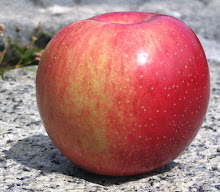Ah, Macoun, lady fair! If McIntosh is the king of the New England apples, then Macoun, with its distinctive bouquet, is surely queen.

|
Macoun (pronounced "Ma-cow-an") is medium to medium-large and sports a red blush that runs from deep and purplish to streaky over bright green, freckled with small light tan lenticels.
The fruit is ribbed—I've had three-lobed Macouns that boasted a triangular horizontal cross-section—but with considerable variation. The stem is short, which poses some problems for growers.
The flesh is a snowy white sometimes tinged with green, fine-grained, juicy, and very crisp. Macoun tastes wonderful—a nice sweet-tart balance with hints of strawberries, plus spice and floral notes.
The fruit's wine-like acidity swims thrillingly in the river of these flavors. Macoun's distinctive savor lingers like a cool drink and elevates this apple to the first rank. Eating one is a treat.
 In the best of all possible worlds I would taste every fruit at peak. In this
world I found these in a supermarket that had a box of heirlooms from an
orchard in New York. (Credit where due: this was
not just any supermarket.) And
I am glad to get them, along with two
Esopus Spitzenbergs
that I will taste soon.
In the best of all possible worlds I would taste every fruit at peak. In this
world I found these in a supermarket that had a box of heirlooms from an
orchard in New York. (Credit where due: this was
not just any supermarket.) And
I am glad to get them, along with two
Esopus Spitzenbergs
that I will taste soon.
Macoun is a cross of McIntosh and Jersey Black that was developed in 1932 at the pomaceously prolific New York State Agricultural Experiment Station in Geneva (New York).
They are available around here from September through early November, and at farmers market Macoun commands a premium over other apples.
Which I gladly pay. I admit it: this is my favorite eating apple. I just finished one and wish I had another.
Update: I took a second bite at this apple later in the season.
Update: UMass's Jon Clements calls Macoun a "cult apple" in this video.

Something that keeps surprising me in your posts is how recent the development of so many of these apples. The Macoun dates from 1932? Man, I'd have thought it was much more traditional.
ReplyDeleteI'd be very interested in at some point seeing a pomaceous family tree/historical timeline.
I had the same reaction. I guess I am guilty of romanticizing this fruit, and also of discounting in some way the value of modern pomaculture.
ReplyDeleteAs in, This classical apple variety is so authentic and wonderful, it must be really old and have been discovered growing on the side of a mountain by some colorful character.
Whereas the truth, that human effort bred this variety, is no less marvelous, in some ways more so.
Or not always--I am working up a post about a (failed) attempt to use radiation to some new mutant apple varieties.
We tried Macoun apples from an orchard here in Wisconsin last fall. They are great not only for their taste but also their size. Sometimes all you want is a snack and this apple is the perfect size for doing just that. They are nice in American cider (juice) also. Our examples did not keep very long in the fridge but I would suspect that unless you have a bushel or more of these you won't have a problem with them sitting around too long!
ReplyDeleteMatt, I imagine these would make some exceptional sweet cider. You generally don't see Macoun pressed, since they still command a premium as whole apples.
ReplyDeleteIf I understand your comment, your Wisconsin Macouns were on the small side. If so, they may have been unsuitable for the wholesale market and thus pressed for cider. Lucky you!
You are correct in that the cider was amazingly sweet. It was the best I have ever tasted. We had a pretty bad windstorm that doomed the short-stemmed Macoun crop in our area. This grower was able to get some 1st quality crops but he stated 95% were 2nd quality and sold for a discounted price. I am guessing that Macoun cider was a product of an abundance of wind fallen apples. I also wanted to mention that we live close to an heirloom orchard that I have yet to check out. My goal is make a few trips this year and taste as many of the old gems as I can. I hope to add comments to some of your already reviewed apples. Maybe we can ship you some to try also. The orchard is just outside of Milwaukee. Try googling Weston's Antique Apples. They have an amazing selection!
ReplyDeleteWest WI: I want to visit Westons sooooo much. Lucky you! I especially wanted to try the Cornish Gillyflower and get my hands on some Cox’s Orange Pippins to finally taste them. Not many people grow antique varieties this side of the state.
Delete"Sweet cider" = unfermented (as opposed to "hard"). I try to make the distinction because in other parts of the world "cider" refers to the hard stuff.
ReplyDeleteIt is sweet. I find it cloying if not chilled.
Thank you for the link to Weston Apples; 100 varieties is impressive and tantalizing!
Hi Adam, thanks for your website. Too bad I did not know about it before starting my home orchard, however my 14 trees are not a bad selection. After all I have Cox's Orange Pippin, Esopus Spitzenberg, Ashmead's Kernel to name a few - I will have to send some to you when they are producing. Because of your blog, I changed my order from Blue Pearmain to Macoan next year (also ordered Wickson and Red Berplesch). You can view my orchard on Orange Pippin (pa_docent). Now if my trees were only more mature and would produce fruit! Mike
ReplyDeleteThat's an impressive (and possibly challenging) assortment! I wish you well with it.
DeleteTasted my first box-worth of Macoun last fall. What a find! This and Beacon, also tasted first time last year, challenge my disdain for sweet apples. I like 'em when they are complex and sweet! The Macoun were grown along the Columbia River just north of Wenatchee, WA: these had profuse flavor components and a lingering vanilla finish. Fabulous.
ReplyDeleteI am not used to thinking of these as growing west of the Mississippi, though obviously they are.
DeleteMacoun is so abundant in the Northeast that I am able to buy them today at my local supermarket. Not as good as in September, but not bad at all.
This season was earlier than any other on record, followed by the hottest driest summer ever. I missed the Macoun crop by at least 2 weeks, sigh. I know of only two places to get Macoun in eastern Washington state. Next year.
DeleteBTW, have you yet tried Jersey Black? It cannot be found out this way, and I'd like to see your take on it, since it is a parent of Macoun.
DeleteRe Jersey Black: Someone must grow them, but I think their claim to fame is as the pollen parent of Macoun.
DeleteAnyway, I’ve never had the pleasure.
They are still pretty good for March. I shake my head when I see them next to Macs and Cortland apple which can't be good still.
ReplyDeleteYes, I'm enjoying them a lot too. Just a shadow of their September selves but still good when not mishandled.
DeleteThey'll probably give out soon and I'll fall back on Empires to satisfy my McIntosh-family cravings.
New York Macouns have made it into our local Sprouts supermarket this year. Now I see why you gave them three stars!
ReplyDeleteThey are even better straight from the tree in early October. But they can do pretty well in storage if handled right.
DeleteI'm eating supermarket Macouns too, at this point.
Mike, I'm glad you got to try some!
I grow Macoun in SE WI. It grows well and is fabulous for fresh eating. However it also makes a suburb applesauce that is silky smooth in texture. Ok for pies and sweet apple cider too. Drawbacks? Like all McIntosh crosses, this variety has heavy fruit drop as ripening nears. It also seems to be a shy bearer compared to my 21 other apples varieties I grow.
ReplyDeleteI was born and raised in NY where these bad boys originated, and they are hands down my family’s favorite apple…always have been!
ReplyDeleteThey are exquisite.
DeleteWestern WI: I was so excited to taste Macon after reading about it here. Unfortunately two things put me off. The ones I got had been in storage (just refrigerated) too long and were not crisp. But the taste was nice. And the second thing I didn’t care for was the very thick, tough skin (that is a reason why I don’t like a lot of so-called keepers (such as State Fair)). Maybe next year I will catch it at its peak and think better of it. Also, we have had a pretty droughty year, and that may have caused a thicker skin than normal. So I await next year to try and get these fresh, if I can. :(
ReplyDelete@Anony, Macoun is not a keeper, though modern storage can keep it pretty good for a while. I don't think of it as having particularly thick skin, either.
Delete